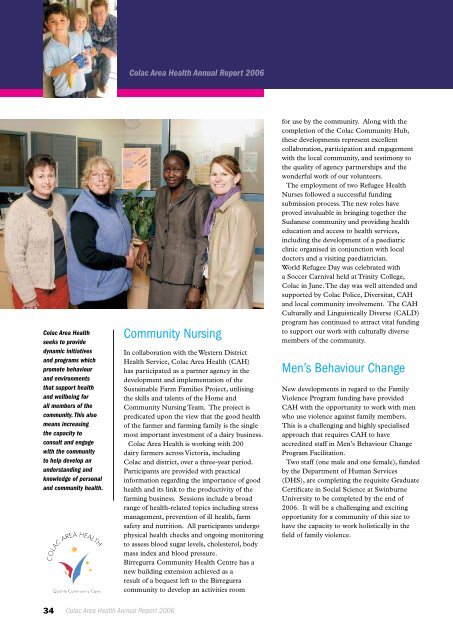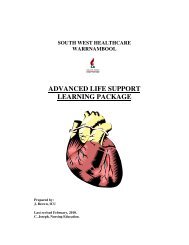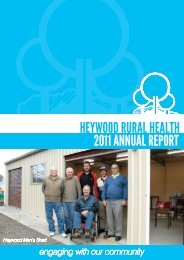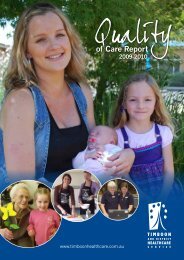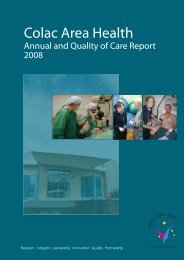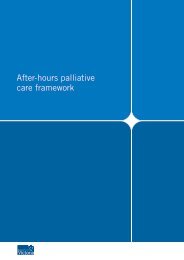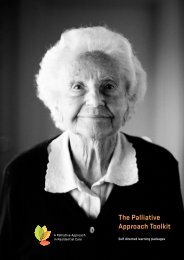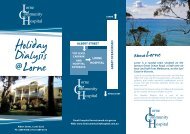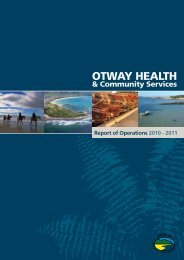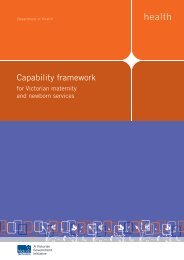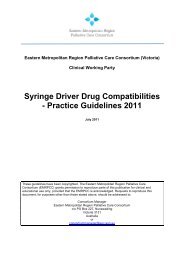CAH Annual Report 2006 - South West Alliance of Rural Health
CAH Annual Report 2006 - South West Alliance of Rural Health
CAH Annual Report 2006 - South West Alliance of Rural Health
- No tags were found...
Create successful ePaper yourself
Turn your PDF publications into a flip-book with our unique Google optimized e-Paper software.
Colac Area <strong>Health</strong> <strong>Annual</strong> <strong>Report</strong> <strong>2006</strong>Colac Area <strong>Health</strong>seeks to providedynamic initiativesand programs whichpromote behaviourand environmentsthat support healthand wellbeing forall members <strong>of</strong> thecommunity. This alsomeans increasingthe capacity toconsult and engagewith the communityto help develop anunderstanding andknowledge <strong>of</strong> personaland community health.Community NursingIn collaboration with the <strong>West</strong>ern District<strong>Health</strong> Service, Colac Area <strong>Health</strong> (<strong>CAH</strong>)has participated as a partner agency in thedevelopment and implementation <strong>of</strong> theSustainable Farm Families Project, utilisingthe skills and talents <strong>of</strong> the Home andCommunity Nursing Team. The project ispredicated upon the view that the good health<strong>of</strong> the farmer and farming family is the singlemost important investment <strong>of</strong> a dairy business.Colac Area <strong>Health</strong> is working with 200dairy farmers across Victoria, includingColac and district, over a three-year period.Participants are provided with practicalinformation regarding the importance <strong>of</strong> goodhealth and its link to the productivity <strong>of</strong> thefarming business. Sessions include a broadrange <strong>of</strong> health-related topics including stressmanagement, prevention <strong>of</strong> ill health, farmsafety and nutrition. All participants undergophysical health checks and ongoing monitoringto assess blood sugar levels, cholesterol, bodymass index and blood pressure.Birregurra Community <strong>Health</strong> Centre has anew building extension achieved as aresult <strong>of</strong> a bequest left to the Birregurracommunity to develop an activities roomfor use by the community. Along with thecompletion <strong>of</strong> the Colac Community Hub,these developments represent excellentcollaboration, participation and engagementwith the local community, and testimony tothe quality <strong>of</strong> agency partnerships and thewonderful work <strong>of</strong> our volunteers.The employment <strong>of</strong> two Refugee <strong>Health</strong>Nurses followed a successful fundingsubmission process. The new roles haveproved invaluable in bringing together theSudanese community and providing healtheducation and access to health services,including the development <strong>of</strong> a paediatricclinic organised in conjunction with localdoctors and a visiting paediatrician.World Refugee Day was celebrated witha Soccer Carnival held at Trinity College,Colac in June. The day was well attended andsupported by Colac Police, Diversitat, <strong>CAH</strong>and local community involvement. The <strong>CAH</strong>Culturally and Linguistically Diverse (CALD)program has continued to attract vital fundingto support our work with culturally diversemembers <strong>of</strong> the community.Men’s Behaviour ChangeNew developments in regard to the FamilyViolence Program funding have provided<strong>CAH</strong> with the opportunity to work with menwho use violence against family members.This is a challenging and highly specialisedapproach that requires <strong>CAH</strong> to haveaccredited staff in Men’s Behaviour ChangeProgram Facilitation.Two staff (one male and one female), fundedby the Department <strong>of</strong> Human Services(DHS), are completing the requisite GraduateCertificate in Social Science at SwinburneUniversity to be completed by the end <strong>of</strong><strong>2006</strong>. It will be a challenging and excitingopportunity for a community <strong>of</strong> this size tohave the capacity to work holistically in thefield <strong>of</strong> family violence.The Social YouthConnective in Colac(SYCIC)The Social Youth Connective in Colac(SYCIC) is a vibrant group <strong>of</strong> young peoplewho are working closely with a variety <strong>of</strong>staff to ensure that we are aware <strong>of</strong>, andaddressing, pertinent issues for young peoplein the Colac region. This group initiallyparticipated in a two-day Peer Skills andAdventure Activity Program with Colac Area<strong>Health</strong> (<strong>CAH</strong>) staff and meet on a regularbasis as a group and with their mentor. Thegroup has organised an alcohol and drugfree“Open Mic(rophone)” event, convenedand supported same sex attraction initiatives,completed alcohol and other drug peereducation and much more.Smoking CessationService (SCS)The Smoking Cessation Service (SCS) wasestablished at <strong>CAH</strong> in July 2005. The firstgroup <strong>of</strong> clients commenced in August.The service covers both community-basedoutpatients and acute inpatients, includingthose in the Pre-admission Clinic.The evidence base for this service was set outin Smoking Cessation Guidelines establishedby the Woolcock Institute <strong>of</strong> Medical Researchin Sydney and supported by the Lung <strong>Health</strong>Promotion Centre <strong>of</strong> the Alfred Hospital inMelbourne. Formal training was undertakenby three <strong>CAH</strong> staff to deliver this service. Theteam has forged strong ongoing relationshipswith other health organisations seeking toestablish a similar service.The demand for appointments exceedsavailability, with the greatest source <strong>of</strong> referralscoming from General Practitioners and theBarwon Mental <strong>Health</strong> Team. An increasingnumber <strong>of</strong> clients are self-referred.The raw data for evaluation <strong>of</strong> the SmokingCessation Clinic is currently being collectedand collated. Early figures indicate that thesuccess rate <strong>of</strong> 64% established in the firstsix months should be maintained. This highlevel is in keeping with the expected outcomesestablished by The Royal Prince AlfredHospital in Sydney. A total <strong>of</strong> 114 registeredclients have been seen between the months <strong>of</strong>August 2005 and June <strong>2006</strong>.These examples encapsulate the range anddiversity <strong>of</strong> our work and strongly complementthe standard ‘core business’ functions <strong>of</strong>the Primary Care Division. Colac Area<strong>Health</strong> seeks to provide dynamic initiativesand high quality programs, promotingbehaviour and environments that supporthealth and wellbeing for all members <strong>of</strong> thecommunity. In practical terms, this alsomeans increasing the capacity to consult andengage with the community to help developjoint understanding and shared knowledge <strong>of</strong>personal and community health.Our emphasis upon health promotion anda social model <strong>of</strong> health is built upon strongand meaningful consumer participation,which provides valuable momentum towardsthe achievement <strong>of</strong> good health outcomesacross all sections <strong>of</strong> our increasingly diversecommunity.John TownsendDirector <strong>of</strong> Primary CareYoung people involvedin the Social YouthConnective in Colacwork closely with ColacArea <strong>Health</strong> staff toraise awareness <strong>of</strong>issues affecting youngpeople in the region.34Colac Area <strong>Health</strong> <strong>Annual</strong> <strong>Report</strong> <strong>2006</strong>35


